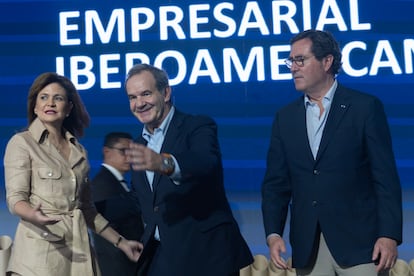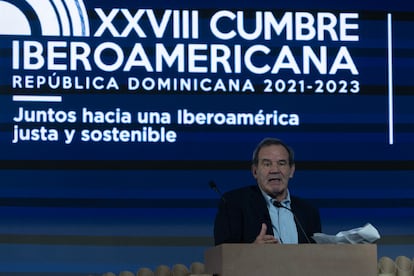Ibero-American Summit seeks agreements on credit, climate change, food security and the digital divide
The meeting in the Dominican Republic, which will also address the region’s migratory challenges, seeks to define an agenda to promote integration on both sides of the Atlantic


The Organization of Ibero-American States (OEI) will convene for a conference on March 24 and 25 in the Dominican Republic to finalize four proposals drawn up by delegations from the 22 participating nations. The XXVIII Ibero-American Summit, convened under the slogan “Together for a fair and sustainable Ibero-America,” will discuss four major agreements on climate change, food security, the digital divide and a proposal on credit and international financial architecture. The meeting in Santo Domingo will also seek to lay the foundations for facilitating integration between OEI member nations on both sides of the Atlantic while some of the heads of state in attendance, such as Chilean President Gabriel Boric, are determined to encourage a debate on the Latin American region’s migratory challenges.
After holding sectoral workshops on the climate crisis and economic challenges, the summit plans to approve two charters, a strategy, and a joint communiqué. The first, christened the Ibero-American Environmental Charter (also known as the Green Pact), was first proposed in July 2022 as the “biggest political agreement ever reached by the Ibero-American Conference on environmental issues.” A working document has been in the draft stage since then and according to sources within the organization it will set out guidelines to orient public policies to protect biodiversity, combat pollution and manage the consequences of global warming.
The second is an Ibero-American Charter of Principles and Rights in Digital Environments. This agreement will be based on the diagnosis of the gaps that already exist between member countries and those within their own territories, which in some cases are particularly wide due to the economic fabric and geographical characteristics. According to the draft, the aim of the charter is to encourage inclusion and promote legislation that has an impact on both the public and private sectors, such as in education or in the digital transformation of companies and industries, with the aim of increasing competitiveness, development, and their impact on the labor market.
The third agreement the summit will aim to enshrine is a strategy related to food security. The proposals presented by the delegations seek to increase trade within the region, support the development of supply chains, promote and consolidate small-scale agriculture and improve financing systems both for the agrifood sector and the promotion of digital infrastructures in rural territories. This section will also focus on initiatives to tackle climate change. The most recent report produced by the Ibero-American Observatory on Climate Change and presented on Wednesday by the head of the Ibero-American General Secretariat, former Chilean foreign minister Andrés Allamand, notes that 45% of greenhouse gas emissions in the 22 countries that comprise the bloc are generated by the food sector as a whole.
The fourth objective of the summit is to issue a special communiqué on international financial architecture, the basis of which will be a proposal to pursue a more inclusive, flexible, and fairer financial system through credits, especially in a context of economic recovery from the Covid-19 pandemic. The proposals are, ultimately, based on the fight against inequality and energy transition processes. All the documents have been prepared with a gender focus, recommending measures to promote women’s participation and reduce the inequality gap in the labor market. Another focus is education, with special attention on children, as well as issues such as innovation and universal healthcare.

Spain to propose Ukraine war statement
Reaching such consensus is significant as doing so involves bringing together 22 delegations whose political and economic landscapes are marked by different agendas and which, in some cases, are ideologically diametrically opposed to each other. And it is common for presidents, foreign ministers, or delegations to attempt to draw attention to other urgent international matters on the sidelines of the Ibero-American Summit discussions. The Spanish government, for example, will propose the inclusion in the summit’s final declaration of a paragraph on Ukraine and a reference to a just peace within the framework established by the United Nations. On the other side of the coin, there are no plans to delve into the Nicaraguan crisis.
There are also countries that will seek a gesture toward their own interests. Cuban Foreign Minister Bruno Rodríguez called on Thursday for the Santo Domingo meeting to facilitate “financial and technological transfers to developing countries and equitable access to resources to reverse current enormous inequalities.” But, above all, Rodríguez took advantage of the presence of the Cuban delegation in Santo Domingo to make a statement against Washington and President Joe Biden’s administration.
“We are confident that this meeting in the Dominican Republic will demonstrate the firm rejection of the arbitrary and unilateral U.S. classification of our country as a sponsor of terrorism and we hope count on the traditional and valuable support of Ibero-America over the just demand to end the criminal and illegal blockade imposed against the Cuban people, intensified to unprecedented extremes during the pandemic,” Rodríguez said in a video posted on social networks.
Conspicuous by their absence in the Dominican Republic will be the presidents of the two Latin American giants in terms of GDP and population, Brazil and Mexico. Luiz Inácio Lula da Silva will not attend the summit as he is on a five-day visit to China while the government of Andrés Manuel López Obrador, who is not overly keen on international summits, has chosen not to send Foreign Minister Marcelo Ebrard. The Mexican delegation will instead be headed by the undersecretary for Latin America and the Caribbean, Maximiliano Reyes. Meanwhile, Colombian President Gustavo Petro - who met with Nicolás Maduro (who will also not attend the summit) in Caracas on Thursday – Argentinean President Alberto Fernández and Boric will use the occasion of the conference to seek a strengthen of their alliance of progressive governments. At the same time, Fernández and Brazilian Foreign Minister Mauro Vieira will join forces to try to revive the Union of South American Nations, another regional forum comprising 12 Latin American countries that was largely disbanded between 2018 and 2020 when most participants withdrew.
Sign up for our weekly newsletter to get more English-language news coverage from EL PAÍS USA Edition
Tu suscripción se está usando en otro dispositivo
¿Quieres añadir otro usuario a tu suscripción?
Si continúas leyendo en este dispositivo, no se podrá leer en el otro.
FlechaTu suscripción se está usando en otro dispositivo y solo puedes acceder a EL PAÍS desde un dispositivo a la vez.
Si quieres compartir tu cuenta, cambia tu suscripción a la modalidad Premium, así podrás añadir otro usuario. Cada uno accederá con su propia cuenta de email, lo que os permitirá personalizar vuestra experiencia en EL PAÍS.
¿Tienes una suscripción de empresa? Accede aquí para contratar más cuentas.
En el caso de no saber quién está usando tu cuenta, te recomendamos cambiar tu contraseña aquí.
Si decides continuar compartiendo tu cuenta, este mensaje se mostrará en tu dispositivo y en el de la otra persona que está usando tu cuenta de forma indefinida, afectando a tu experiencia de lectura. Puedes consultar aquí los términos y condiciones de la suscripción digital.








































